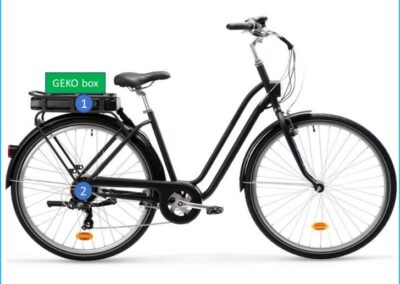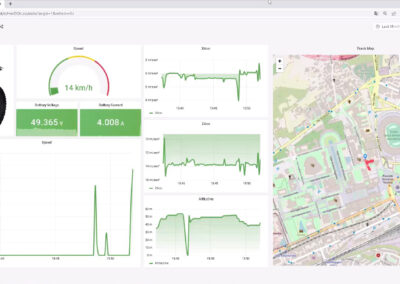Pilot Experiments
GEKO: Gear and Propulsion Integrated Control in Connected Electrified Mobility
Italy
![]() Campania Digital Innovation Hub
Campania Digital Innovation Hub
Experiment objective
The experiment GEKO – Gear and propulsion integrated control in connected electrified mobility is aimed at proving the benefits of a user centred design of integrated power management systems (PMSs) for electrified transportation means, achievable by a synergic use of smart modelling, internet of things (IoT), data gathering and analytics, artificial intelligence (AI) and machine learning (ML) technologies. demonstrating the feasibility and concrete operation of an innovative concept of a fully digitalised control system of the on-board power supplies and requests in a vehicle. A virtual component and system integration framework for the efficient development of future electrified connected powertrains will be developed.
Challenges
An IoT approach to electric propulsion and to transmission, as well as to auxiliary activation by possible power split, has been fairly addressed up to present in affordable configurations, and is a lack that the GEKO experiment intends to reduce, just by resorting to digitalisation. The business idea by DG Twin derives from the consideration of the current rapidly evolving social scenario, affected by needs of people continuously connected to the web, hence intrinsically updated on trends and novelties. Digitalisation is seen by the SME as a mandatory enabler if industrial players want to keep up with the prompt changes in customer expectations. Within the energy and propulsion sectors, the demand for customised PMS is widespread today just to comply with the flexibility prerequisite, in various applications. In particular, transportation is decisively transforming due to spreading electromobility. In the automotive segment, the recently introduced fleet CO2 emission limits for European OEMs has led to a broad range of electrified configurations added to the existing portfolio. A rapidly evolving range of light means of personal shift are also progressively populating streets across the globe: new micro-vehicles seem to be released daily, for private or shared use and for food and good delivery, to more easily navigate congested city streets.
Implementation Solution
The model by DG Twin will account for all the mechanical and electrical components enabling the motion, including the wheels, the propulsion system, the battery, the gear, as well as the overall control system. This las is seen as the “brain” of the vehicle entailing the interaction with the user and acting to regulate the energy flows from the battery to the electric motor and, here in an original way, also the transmission ratio of the rotating mechanisms. The model will enable straightforward quantitative assessments of the system response to changes in its main controlling parameters, hence for rapid prototyping scopes or as a robust design tool. As a further digital element, the availability of increasingly pervasive and performing means of communication will be considered: an interface with both environment and on-board sensors will allow monitoring the vehicle performance during its operation. The considered application is for an electric bicycle mounting a wheel motor where the pedal assist system supports the muscular effort by the rider through proper gear ratios, although the underlying development process of the new PMS and the expected outcomes have a very general character and will be in the future directly transferred to other vehicle categories, also to marine vessels.
Results Obtained
The experiment “GEKO” was able to release an integrated platform for design, remote control and upgrade of the power management system with a demo in real environment for an e-bike. The new fully digitalized system is “self-adaptive” to the context of use, as it is built on real time collected data gathered on a cloud, it allows perfectly balancing energy use dynamically, by applying suggested gear and propulsion assistance level on a properly made small screen on the bar, based on the street conditions, passenger weight and driver needs on the specific use profile. In the future the system could be linked to the electronic control unit of the electric motor so to autonomously drive the choices suggested by the AI algorithm resident on the Cloud.
Impact of the experiment
The main outcome of the experiment is remarked through an original digital twin based control system of energy flows to be applied on board of electric vehicles and a relative methods for its operation. The impact is represented by the GEKO system which allows a reduced cost of integrated pedal assist and gear systems for electric bikes that offers superior performances compared to standards, as diversified functional uses and less fatigue to riders. However, the system could easily be applied to different contexts, allowing the SME to expand his business scenario for future application, as for fleet management.
Dissemination
The following activities were realised by the DIH and its Consultants:
- A final study will focus on the reporting of the main Experiment scope and findings, published in the number 2/2022 of Infosfera (http://www.campaniadih.it/infosfera/), a magazine published by Campania DIH.
- Article published on the Campania DIH website on the occasion of the award of the DIHWORLD 1st Open Call. A preliminary news was published on the newspaper Il Mattino and also appeared on il Denaro and other local social media.
- Article published on the Campania DIH website on the internationalization mission carried out by the Campania DIH in Dubai. During the mission, the director of the Campania DIH also illustrated the GEKO project, as reported in the article.
As further dissemination activities, two events were organised by the Campania DIH: – Sino Italian Exchange Event 2021, 21.10.2021, Città della Scienza, Neaples, Italy (https://www.cittadellascienza-cina.it/sino-italian-exchange-event/) and – DIH WORLD Community Days: Green and digital transition in Manufacturing, 3.5.2022
The team also participated in the ENLIT Initiate Programme in Milan in December 2021, and in a series of events organized at Campania Newsteel.; Motor Valley Accelerator.
Posts were also made on Social Media as Twitter and LinkedIn concerning the realized activities within GEKO.


